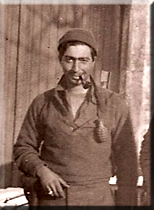
Bernie Diamond's Story ... told by himself
The truth is, I never wanted to write my war memories, but my wife. ,y three daughters, and my good friend Peter Heckmanns, who is the webmaster of this website, wanted me to. I resited for a long time, but finally agreed, so here it is as I remember it ...
My parents both came to the United States of America seperately from Russia. My father came to the States in November 1920 and my mother in December 1921. They met in New York in 1923. I was born on June 6, 1925 and raised in Manhattan and the Bronx, New York. I was born and raised in a family with another younger brother and a sister.
I went to two High Schools when I was older, the first was Morris High School, where I took an academic curriculum, and the other was New York Vocational High School, where I took a course in engineering drafting.
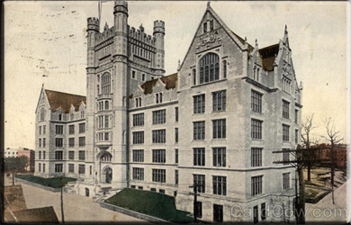 Morris High School, NY - 1924
Morris High School, NY - 1924When I was seventeen years old I applied to Cooper Union, a free college in New York, to study engineering. I was accepted to Cooper Union, but was drafted into the Army when I was eighteen years old. I was eighteen years old on June 6, 1944, and I was in the Army in September 1944. I took an intelligence test when I was drafted, passed and I was accepted in the Army Specialized Traing Course (ASTP), and I was sent to North Carolina State College, for a four-year college course in engineering, to be completed in two years !!
 Cooper Union College, NY
Cooper Union College, NYThe Army Specialized Training Program was a military training program instituted by the United States Army during World War II at a number of American universities to meet wartime demands for junior officers and soldiers with technical skills. The purpose of the program was "to provide the continuous and accelerated flow of high grade technicians and specialists needed by the Army. Manpower planners calculated that more infantrymen would be required in advance of the planned invasion of Europe. ASTP was not only one of the easiest programs to reduce or eliminate, it also provided a large pool of ready-trained soldiers. In February 1944, about 110,000 ASTP students were told they would be transferred to combat units.
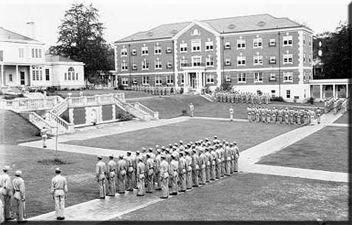 ASTP soldiers at drill
ASTP soldiers at drillThe program was closed down when I was only less than halfway through because the United States Army was in need of infantry because of the War in the Europe and the Pacific. I was sent to the 87th Infantry Division. During Basic Training at Fort Jackson, South Carolina in 1944, I received the Highest Expert Score in Marksmanship (Rifle & Pistol) in the entire training regiment.
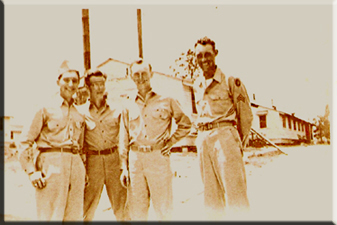 In Fort Jackson, in the 87th Infantry Division
From left to right: Me, Harvey, Mallery and Traphagen
In Fort Jackson, in the 87th Infantry Division
From left to right: Me, Harvey, Mallery and TraphagenEMBARKATION Because we couldn't get passes legally, My buddy Harvey and I literally "go through the fence" at Camp Kilmer, to get home before leaving for Europe, with the 87th Division. Harvey's home is in Short Hills, NJ, and my home is in the Inwood Section of Manhatten, New York. We're both back in Camp by morning roll call, without being missed.
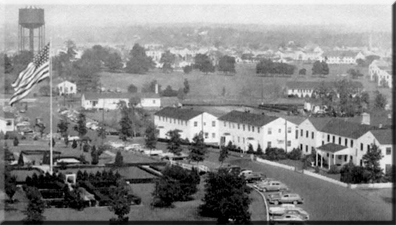 Camp Kilmer, New Jersey
Camp Kilmer, New JerseyQUEEN ELIZABETH
We are one of the last troops (the 87th
Division and the 11th Armored Division,) some 18,000 soldiers, to be loaded aboard the ship. Luckily we get a small stateroom
on "B" deck, with six bunks, and a small bathroom (with running cold salt sea water). As one of the company barbers, I have
to cut hair for those soldiers who need it.
The truth is that I never was a barber. When I was 17, and a senior in high school, I applied to Cooper Union, an
Engineering school in NY, at that time, that was a free school. I was accepted, and was going to go to Cooper Union
Engineering School, that fall, but like everyone else, I had to register for the draft. I was 18 on June 6, and was drafted
in Sept. 1939! Because I had a high I. Q., I was sent to the A. S. T. P., (Army Specialized Training Program) where I went
to North Carolina State College to take a 4-yr Engineering course in 2 years! The program was closed after I had been there
a few months, because troops were needed for the immediate deployment in Europe.
I was assigned to the 87th division, and trained with them. Before we went overseas, the company’s T. O. (Table of
Organization) had to be complete. Well, the T. O. called for each Infantry Company to have a barber. My company’s 1st.
Sergeant, Sam Luchessi, designated me to be the company’s barber! It was arbitrary, but that was how it happened. I was
issued a barber’s kit (containing two hand clippers, a comb, and a straight razor). After that, each week, 1st. Sergeant
Luchessi would call an inspection, and all those that needed a haircut, had to have me do it. It was “on the job” training!
After the war, I never cut hair.
The troops are all given color-coded tags to designate in which section of the ship we are authorized to be. Harvey and I
cut some of the tags from unsuspecting soldiers that then permit us to wear the tags, and have the run of the entire "B" deck.
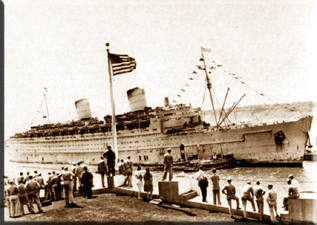 The Queen Elizabeth
The Queen ElizabethHarvey and I enjoy the freedom of "B" deck, and enjoy the trip. But Sgt. Gilbert is seasick, and we tease him, telling him the boat "goes u-u-up and do-o-wn, u-u-up and do-o-wn". We get across the Atlantic in very fast time (about 5 1/2 days), and see the beautiful purple heather of the Scotland hills as we sail into the Firth of Clyde.
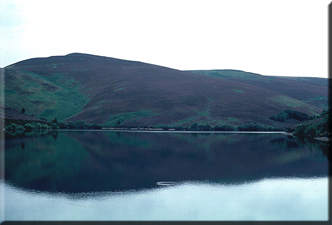 "the beautiful purple heather of the Scotland hills..."
"the beautiful purple heather of the Scotland hills..."ENGLAND We take the train from Scotland to England, and we are stationed in a town called Leek, England, about 25 miles south of Manchester. The barracks have little or no heat and ice-cold showers. Brrr...
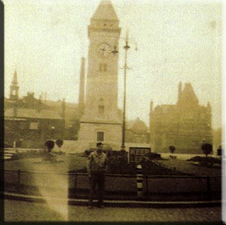 Leek, England 1944
Leek, England 1944(picture courtesy www.463rdaaa.com)
ENGLAND
Playing soccer in Leek, England with local soccer team, and realized how out of shape I was running up and down the field!
Buying and eating "fish and chips" wrapped in newspaper from a street vendor and finding the food tasty.
We go into town to check out the pubs. Five of us go into a pub and Harvey orders five Guinness Stouts for us, which
is a heavy, black beer! We didn't know that even the English mix Guinness with ale (half and half) because Guinness is too
heavy to drink straight.
Getting a pass to go to Manchester where the city is bombed and blacked out. I go to the local Art Museum.
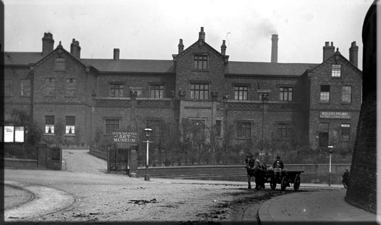 The Manchester Art Museum
The Manchester Art MuseumTHE ENGLISH CHANNEL
We cross to France inside an old ferryboat, with a single kerosene lamp swinging from the ceiling for interior light.
The fumes are terrible. Many are seasick, but not me. We land at Le Havre, and are bivouacked in an apple orchard. Its cold
and rainy, and we warm up with Calvados, a whiskey that we find from somewhere.
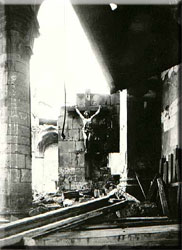 Le Havre, France ...
Le Havre, France ... detruction can take strange shapes ...
METZ
We are driven by trucks, to Metz, France, to co-ordinate with the 5th Division, to assist in the capture of Ft. Driant, still
held by the Germans. When my General Culin asked the German Commander to surrender, the German Commander said he couldn't
because he promised Hitler, that he would not. A "face-saving" solution was made, and the Ft. surrendered!
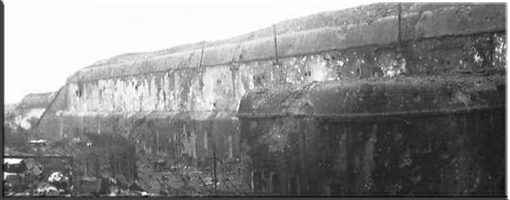 Fort Driant, Metz
Fort Driant, MetzDec. 16 - Our first serious fighting under heavy shelling comes to us outside of a town called Medelsheim outside of Metz. Harvey has his glasses blown off from the concussion of an nearby exploding shell, and Sgts. Woodruff and Miller are killed. After a short time, the company drops most of its equipment and runs back down the hill. We suffer lots of killed and wounded, mostly from artillery. Harvey and I pick up an automatic rifle called a BAR from all the abandoned equipment on the hill (we only had our pistols) to use in case the Germans counter-attack. We find and collect some wounded, and carry them down the hill to a collection point for the medics to care for. I see for the first time, what shelling and shrapnel can do to flesh.
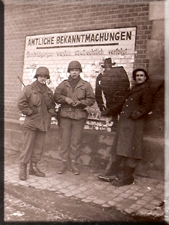 Pireni, Reece and others, Germany 1944
Pireni, Reece and others, Germany 1944the leaflet states "Public announcement" (in German)...
I see someone coming over the hill and down towards us, and
thinking that they were Germans, get ready with the BAR to shoot. At the last moment, I recognize them as Captain Wall and
his runner, MacDonald. Captain Wall was in a daze, asking me where his company was. I guess he and Paul Cutler and MacDonald were
over the rise, and didn't really see what was happening on our side of the hill.
A few days later the 87th Division were all put on open 6x6 trucks and are driven some 300 miles North to Moircy, Belgium,
and to where the Germans had broken through, and that became known as the Battle of The Bulge in the Ardennes forest.
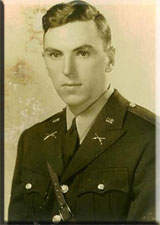 Captain Howard J Wall
Captain Howard J WallCaptain Wall was KIA on February 8, 1945
ARDENNES Waking up to see tank tracks in the snow right next to where Harvey an I had been sleeping in our sleeping bags. We didn't hear a thing, when the tanks came by, that's how tired we were. My seeing a "booby trap" wire frozen in the snow as I trip on it, and the freezing prevents the mine's activation. I was very lucky! Shrapnel from tree bursts that pass between Harvey and me while we are lying in the snow.
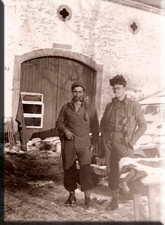 My buddy Harvey and me...
My buddy Harvey and me...ARDENNES Harvey and I carry a wounded soldier named Bullock on a stretcher to the aid station, through heavy, waist-high snow. It takes us hours because of the heavy going, and when we get there, we have our feet checked because they were almost frozen. The medic who looked at them said, "You guys just got bad feet". Sgt. Sims would never venture out of his fox-hole at night, so we just gave him the phone when he was on guard duty, knowing that he would not sleep nor get out of his foxhole to pass the phone after his two hour guard stint. That lets us get a good night's sleep.
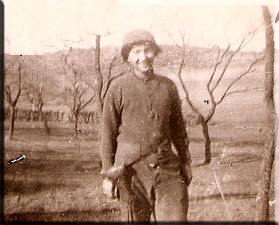
ARDENNES We are in a defensive position where we are able to dig in with a two-man foxhole, with logs over the top and straw on the bottom. Harvey is inside the foxhole and I'm outside. In trying to light a small kerosene stove, the straw catches fire, and in trying to put out the fire, Harvey tries to throw the stove out of the foxhole. The flameing stove hits the edge of the hole and bounces back in. I find this very funny and begin laughing. Harvey tries a couple of times to throw the burning stove out of the fox-hole, and each time the stove bounces back in, and each time I laugh louder. He finally gets it out of the hole, and by this time I'm hysterical with laughter.
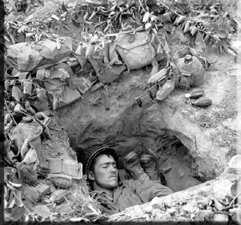 Infantrymen sleeping in a foxhole...
Infantrymen sleeping in a foxhole...(picture courtesy www.paperlessarchives.com)
ARDENNES I'm picked, with others, to go on a night patrol with the combat engineers to accompany them as their protection while they go to blow up a bridge. Harvey is not picked. We wear white camouflage cover because of the snow, and I'm given a rifle to use. We go all night but the engineers never did find the bridge, and luckily we did not encounter any Germans.
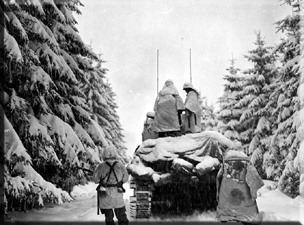 White camouflage in the Ardennes...
White camouflage in the Ardennes...TILLET Remember seeing the first cases of ten-in-one rations strapped on a tank. I was so tired of C Rations and K Rations that Harvey and I "liberated" a case one snowy night.
GERMANY - Kobscheid We find a live, skinny chicken in the barn, and decide to kill it, clean it, and roast it, and then eat it. I use a straight-edge razor from my "Barber's kit" and ruin the blade, but Harvey and I enjoy the chicken. On night guard duty, Harvey and I think we hear something across the road and throw several hand-grenades. Later, (unrelated?) General Patton and his entourage came up in his jeep to check out our positions.
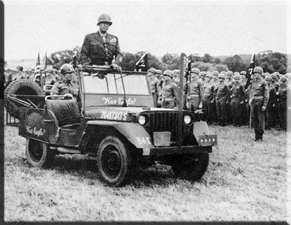 General Patton came to check out our positions...
General Patton came to check out our positions...GERMANY - Neuendorf - February 8th, 1945 My understanding of the initial fuckup at Neuendorf was due to two different patrols that were supposed to have gone in to scout out the town. One came back, saying that the town was clear of Germans. Instead of waiting for the second patrol to report in, it was decided that "L" Company to go in, assuming that the whole town was clear. So we come up the road into town (in a column of two's), and then in the first houses after the bridge, we find a German machine gun post, with two Germans asleep inside! We take them prisoners, but by this time, all hell breaks loose. We continue up the road, towards the church at the crossroads.
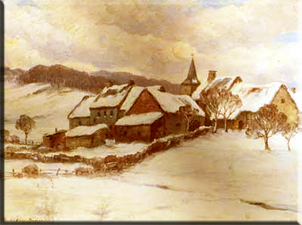 Neuendorf, Germany near Olzheim...
Neuendorf, Germany near Olzheim...GERMANY - Neuendorf - February 8th, 1945 There is a German Self-propelled gun at the side of the church that starts to back up the hill, firing it's gun as it retreats up the hill. Luckily the gun cannot/does not fire on us, but seems to be firing over our heads. The place is lousy with Germans running all over the place towards Rueth, the next town. Capt. Wall tells Sgt. Sims to take some men to the right and to start firing on the Germans who are crossing the field on the right.
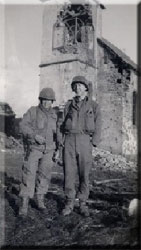 Neuendorf, Germany
Neuendorf, GermanyPerkins and Mallory in front of the church,
where the German self-propelled gun was as it retreated up hill...
Sims seems to react too slowly for Capt. Wall, who sees the Germans running and no action from Sgt. Sims. Capt. Wall then runs up into the second story of a nearby house and begins firing from an open window when he is shot. He comes down into the street on his own power and tells us that he's shot and then collapses in front of us. We try to dress his wound, and then Harvey gets a blanket for a stretcher and I force the two prisoners (who didn't want to do it because of all the firing going on) to pick up Capt. Wall and we carry him back across the bridge to the aid station. Note: When I related this incident to Tony Coscino many years ago, Tony told me that it was he, not Sgt. Sims whom Capt. Wall instructed to fire on the Germans on the right, but I remember the incident as Sims.
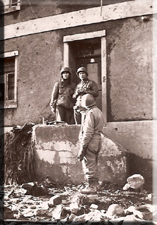 Neuendorf, February 1945
in front of the house where Captain Wall was shot...
Neuendorf, February 1945
in front of the house where Captain Wall was shot...GERMANY - Neuendorf - February 8th, 1945 Capt. Wall is shot. Harvey and I order the two German prisoners to carry him down the hill to the aid station. We get to the aid station (which is a barn across the bridge), and put the captain on some hay, waiting for the medics. Capt. Wall dies, bleeding to death. (The bullet had gone through his chest and out his back), and we didn't realize it. The chickens in the barn walk over his dead body, unconcerned. I'm enraged, and want to kill the prisoners to avenge Wall's death, but Harvey dissuades me, and I don't.
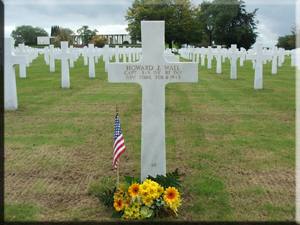 Captain Howard Wall's final resting place
American Military Cemetery Henri-Chapelle, Belgium
Captain Howard Wall's final resting place
American Military Cemetery Henri-Chapelle, BelgiumGERMANY - Neuendorf Some days later, Harvey and I set up our mortar. With binoculars, we see the next village of Rueth, and notice a squad of German soldiers on the road. With blind luck, we fire three rounds at them at maximum range, and hit seven out of eight. The other got up and ran away. It seems to me that the contest for this town changed almost every day and night. Sometimes we control it and sometimes the Germans control it.
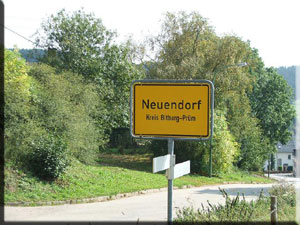 Road in Neuendorf, Germany were we
Road in Neuendorf, Germany were wefound two German machine gunners asleep...
GERMANY - Rueth - Siegfried Line We attack Rueth, and have to go through mine fields to get to the town. Bregman is "frozen", and I have to urge him to move with me. We get to a wire fence, and I ask Harvey for wire cutters. He tells me that the end of the fence is only ten feet away! In town, for the first time I fire my pistol "in anger" at some Germans in a small shack as I run by. In Rueth, a tank runs over my mortar tube, making it oval and therefore useless. I eventually get a new "balls mortar", i.e. one without a bi-pod; just a base plate, and is hand-held.
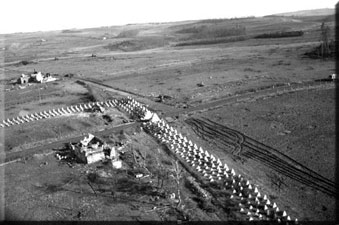 The Siegfried Line
The Siegfried LineGERMANY - Moselle River We are one of the first assault boats to row across, with little trouble. We are on the outskirts of Koblenz.
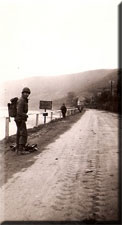 Me crossing the Moselle River
Me crossing the Moselle Riverpicture taken on the outskirts of Koblenz
GERMANY - Rhine River - Leaving Koblenz
we cross the Rhine River at night at a town called Boppard. The road down to the shore is dark, steep, and winding. As we
walk down, we could hear the tinkling of glass as we drink and throw away empty wine bottles from the winery we looted in
Koblenz. The engineers help us row across in small assault boats. About half way across, the Germans on the other side begin
firing their machine guns. Fortunately for us, they fire over our heads to the side we had just left. We see Col. Moran as
we land on the far shore, and he asks us to set up our mortar to fire on the German guns on top of the palisades above us.
We do, and the guns stop.
Note: Later, when the war was over, Harvey told me that Col. Moran said that we did a great job on the shore of the Rhine,
that night!
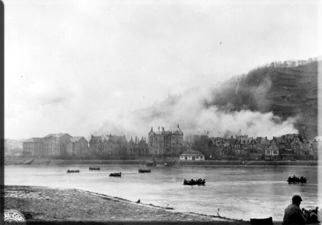 Crossing the Rhine River under smoke
Crossing the Rhine River under smokeGERMANY To keep up with the fleeing Germans, we are mounted on tanks to pursue them. The Germans try to delay us by cutting down trees across the road to stop the tanks. We, the Infantry would get off the tanks to fight the German rear guard, and then remove the road block and continue. We are held up at the liberation of a prison camp called Ohrdruf. In entering the camp, I see piles of shoes, piles of suitcases, piles of pants, and what I thought were baskets-full of pebbles, which turned out to be gold filled teeth. Harvey is not with me. I see some of the more stronger prisoners trying to catch and kill the few remaining guards, hitting the guards with stones and pieces of timber. The prisoners ask us to give them our weapons so that they could kill the guards with them. We don't. One of the prisoners was an Italian POW, who came with us for a few days. He was given a carbine that he subsequently used to kill some Germans that we encountered in the woods a few days later.
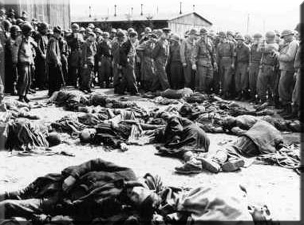 Ohrdruf Prison Camp
Ohrdruf Prison CampGERMANY - Tambach - April 7th Heavy fighting against the SS and Hitler Youth in thick woods. Near a town called Kleinschmalkalden, our third company commander, First Lt. Hall, is killed while trying to negotiate with some Germans who approached under a flag of truce, but they fired on him, killing him. He is our third company commander killed in the line of duty. We kill those Germans.
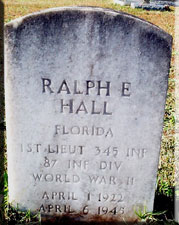 Lt.Ralph E Hall's final resting place...
Lt.Ralph E Hall's final resting place...I hear that T/Sgt Griffin, my platoon sergeant, is hit and decide to see if he can be carried to safety. I go with Tony Coscino, but in trying to cross a road to where Griffin is lying, I'm hit with a bullet in my face, and because I can't see, I have to be helped back to the medics by Tony. I learn later that Griffin was killed.
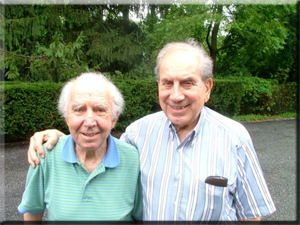 Platoon Sgt Tony Coscino (l) and 1st Sgt Sam Luchessi (r)...
Platoon Sgt Tony Coscino (l) and 1st Sgt Sam Luchessi (r)...Tony helped me when I was wounded at Tambach
GERMANY - Tambach - April 7th Although I'm wounded about 5 o'clock in the afternoon, Cpl. Barsnica, the medic, notes on my tag the time of my wounding as being about 11 AM in the morning so that I would be taken earlier when I get to the aid station. I'm put on a jeep, with Jim Doyle, our BAR man who was also wounded in the same action and the next thing I know I'm at a Battalion Aid station. There the doctors remove the bullet which is still lodged in my head, but leave the metal fragments in my eye because its too delicate an operation for them. I'm flown to a hospital in Paris, but they also decided that they don't have the capability to remove the fragments and save the eye.
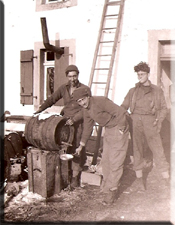 Harvey and me, enjoying better days...
Harvey and me, enjoying better days...USA - Back in the States I'm flown home to the states and sent to Northington General Hospital in Tuscaloosa, Alabama, but the eye couldn't be saved. I called my folks when I landed in New York, and found that I had returned to the States before the telegram got to them telling of my wound! The first they heard of my being home was from my Uncle Ben, whom I had called first because he had a phone. My folks didn't have one! I spent 9 months at Northington General Hospital for recovery and rehabilitation, and was discharged In January, 1946.
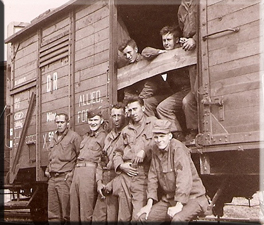 4th platoon after the war
4th platoon after the warAfter I was discharged from the Army Hospital in 1946 I had a
lost my left eye and I had a reconstructed nose because of the bullet wound. I went back to North Carolina to finish my
engineering degree and graduated in 1950. I worked at Piccatinny Arsenal as an engineer, worked on the Apollo Space Program
at Kollsman Instrument Company. met my wife Mimi in 1955 and was married in 1958.
I used to speak frequently by phone with Harvey, but he died in 2006. I used to visit Tony Coscino at his home in Long Island,
but he died in 2005. I do still speak with 1st Sergeant Sam Luchessi (he's now in 2010, 91 years old) every so often.
I have been involved in photography, raised and shown my Yorkshire Terriers at Madison Garden AKC Dog Show. I love skiing,
travel, sailed and raced my own sail boat, and volunteered teaching 6th grade students in the public schools. These days I
enjoy my life and family in Glendale New York...
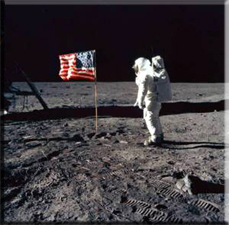 The Apollo Space Program put a man on the moon
The Apollo Space Program put a man on the moon